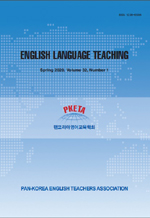한국인 영어 학습자와 영어 원어민의 말하기 조정: 문장 단위 발화에 대한 성별의 영향
Speech accommodation of Korean EFL learners and native English speakers: The influence of gender on sentence-level production
- 팬코리아영어교육학회(구 영남영어교육학회)
- 영어교육연구
- 제36권 3호
-
2024.09109 - 129 (21 pages)
-
DOI : 10.17936/pkelt.2024.36.3.006
- 7

This study investigates the effects of speech accommodation and gender on English vowel productionin sentence contexts among Korean English learners and native speakers. Twenty Korean universitystudents and ten native English speakers participated in the experiment. Participants were required toproduce sentences containing both tense vowels (/i/, /u/) and lax vowels (/ɪ/, /ʊ/). The experiment wasconducted in two stages: a baseline stage where participants produced sentences without the modeltalker's voice and a shadowing stage where they imitated the model talker's voice. The results indicatedthat vowel production adjustments occurred in both groups at the sentence level, but the patterns differedbetween Korean learners and native speakers. Korean learners exhibited a general tendency towardsconvergence for most vowels, whereas native speakers showed divergence for /i/, maintenance for /ɪ/,and convergence for /u/ and /ʊ/. Regarding the model talker's gender, Korean learners generally showedmore convergence, with male learners exhibiting a stronger degree of convergence than female learners,particularly towards the female model talker. In contrast, native speakers exhibited gender-differentiatedpatterns, with male speakers tending towards divergence and female speakers towards convergence,responding more strongly to the male model talker. These gender-specific accommodation differenceswere primarily observed with back vowels. This study provides valuable insights and importantimplications into the sociophonetic dynamics of second language acquisition.
Ⅰ. 서 론
Ⅱ. 이론적 배경 및 선행 연구
Ⅲ. 연구 방법
Ⅳ. 결과 및 논의
Ⅴ. 결 론
참고문헌
(0)
(0)